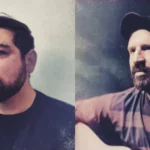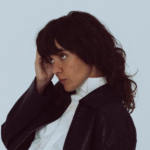In Frah Quintale's music there has always been something suspended. A melancholy that is not sadness, but lucidity: the ability to look inside without fear of what one finds.
With “Amor Proprio”, his new album, that sensitivity becomes maturity. It's a record that talks about balance, relationships, identity, but above all about time – what it takes to understand each other, to forgive each other, to start over. Frah tells it with the lightness that distinguishes him and with the sincerity of someone who has learned to put his thoughts in order, even when they make noise.
A dialogue that crosses music and life, between irony and introspection, in which the artist from Brescia shows himself for what he is: a singer-songwriter who continues to grow without stopping searching for himself.
THE INTERVIEW
We often look for the shortest way to achieve happiness, to heal a soul wound, to fill a void, to feel aligned with others.
For example, some study faculties that they actually don't like, while others still jump from one relationship to another just to not be left alone, out of interest, habit, distraction or simply because someone told them that's how it's done.
Without being hypocritical, I found myself in one of these three categories at least once (there are many others) but then something happened. Being alone taught me to be silent, being silent taught me to listen to myself, listening to myself made me understand better what I want.
As far as I'm concerned, self-love is doing something for yourself regardless of what the world expects of us, it's a process that takes time to establish, grow and direct us towards the people we will be. Once we learn to let ourselves be carried away, we will be able to go exactly where we want and things will happen by themselves, almost by chance. We have all the tools we need to fix ourselves.”
The common thread of the album seems to be the reconstruction of oneself, developed in different stages. Is “Amor Proprio” the tip of the iceberg of this journey?
Yes, I would say yes. “Amor Proprio” is the sum of a journey that has been going on for several years, I would say three or four, and which coincides with the moment in which I started writing the album. It is a record that photographs a precise phase, but also a continuous movement: inside there is everything that is part of a process of growth, acceptance, reconstruction.
There are love relationships, friendships, dreams, ambitions, but also distance, loss, the feeling of no longer belonging to a place.
I tell the story of the moment you decide to let go, or hold back, or take a step back because you understand that something can no longer work. In this sense, self-love is not an act of vanity or selfishness, but a form of care. It's the act of understanding where you are, who you want to be, and who you really want to share that path with.
Among the songs, “Chiodi” seems one of the most personal. Is it your favorite too?
It's definitely one of my favourites, perhaps the one that represents me most at the moment. It is a song that comes from a strong feeling, but which does not just speak of anger or resentment: it speaks of acceptance, of awareness.
In a certain sense it is also linked to Milan, because it tells the story of those who leave and those who stay. It is a very current topic: we all know someone who has left to chase a dream or to look for a future elsewhere. I myself, more than ten years ago, left Brescia to come to Milan and try to make music. Today it seems normal, but in 2013 it wasn't at all, especially in a city like Brescia, where the idea of ”living on art” was not considered a concrete path.
With this piece I wanted to tell the point of view of those who remain. When you love someone, sometimes you have to let them go, even if it hurts. I believe that letting go, in some cases, is a greater form of love than holding on. I really like the passage where I talk about the “abandonment syndrome”, because it's something I've felt too, and writing this song helped me put things in order, understand things, make peace with myself. It's one of those pieces that you feel you wrote to also heal a little.
After almost ten years in Milan, what is your assessment? Is it still a city that inspires artists?
I would say yes, even if today it has become a complex city to live in. Milan can give you a lot, but it also asks for a lot. I was lucky enough to arrive at a time when there was more room to breathe, both economically and artistically. Today, with skyrocketing prices and rents, it is difficult for many to even stay.
More than “inspiring”, Milan connects. It is a city that puts you in contact with people, projects, energies. It pushes you to move, to leave your comfort zone, to confront yourself. Every city has its own frequency, and Milan's is very strong: it's like a transmitter that amplifies what happens here and makes it resonate throughout Italy.
A project born and raised in Milan inevitably has more resonance than one that remains closed in the province, even if today – thanks to social media and the internet – the distances have shortened. When I arrived, in 2014 or 2015, it was different: there was a new ferment, that “indie-pop” scene was forming which would then explode. And somehow Milan was the cradle of all this.
There are several featuring on the album: Joan Thiele, Colapesce, Tony Boy… All different from each other, but in balance. How did these collaborations come about?
Every collaboration has its history, but if I had to find a common thread I would say that it is human before it is artistic.
With Joan I had this sample that took me back to soundtracks, to a cinematic world that I felt was very close to her, both for the type of voice and for her sensitivity. It came out naturally.
With Colapesce, however, we already knew each other. We have talked many times about music and we share a certain way of understanding writing: even if we come from different paths, we both have a strong songwriting streak. In recent years I often went to Ortigia, his homeland, so there was also a more personal connection.
I've known Tony Boy for a long time: I've seen him grow, both as an artist and as a person. When he arrived in Milan he was very young, perhaps twenty years old. I have always considered him one of the most sincere pens of his generation. In a song that talks about confusion, performance anxiety and identity, it seemed like the perfect voice to represent that perspective.
In general, for me collaborations should not be “marketing” choices. They must arise from a true dialogue, from a connection, from mutual esteem. In Amor Proprio all collaborations were born like this, in a natural way.
You've always had a very strong visual side. The painting on the cover, for example, is yours. How do painting and music intertwine in your career?
In reality, I came to music precisely through painting. As a kid I painted and did graffiti, and from there I discovered the world of hip hop, nineties rap and counterculture. They are two different languages but with the same objective: to express what you have inside, to give shape to something that passes through you.
The cover of “Amor Proprio” is a shot by Sha Ribeiro. The painting was born almost by chance. I was painting without a specific intention, and in the meantime I was writing the pieces for the album. At a certain point I started to see a very strong parallel between what I was painting — a toolbox — and the themes that emerged in the songs. The tape represents the way we try to “fix” ourselves: to understand which tools to use to get back together, to heal, to move forward. In the end, the two things merged: painting and music closed a circle, even an aesthetic one.
For me it is important that the project has visual coherence. Where words cannot reach, images can reach. And when I painted the buildings to announce the tour, many wrote to me saying that it was something against the grain, in an era where everything is digital and immediate. But for me it's just natural. I have always had this part within me, even at the time of the Quintale Brothers: I often took care of the artistic direction, the visuals, the covers. It is a language that belongs to me as much as music.
Speaking of tours: in April you start from the arenas. Milan will be the first stop. Is this the right environment to present this new chapter?
I think so. It always depends on what type of show you bring: I'm not into big effects or fireworks, I'm more interested in creating an atmosphere, making my visual and sound world reach even large spaces.
The sports hall, if you think about it, is a place that can contain intimacy, if you build it in the right way. I saw Bon Iver at the Forum: twelve thousand people, but an intimate, almost suspended atmosphere. That's when you understand that it's not the size of the place that makes the difference, but the care with which you think about the show.
I believe that today the challenge for those who make music is precisely this: to bring authenticity even into spaces that seem too large to accommodate it. For me it will be an opportunity to combine everything that I am – music, visual art, aesthetics – and build something coherent and personal.
It's not your first time on such a big stage, right?
No, in fact. I had already played in arenas during the Lovebites tour with Coez. That was a training ground, it gave me awareness of what it means to manage such large spaces and times. This time, however, it will be different: it will be “mine”, one hundred percent.
A live memory is when I sang “Oroscopo” with Calcutta at the Forum. It was my first arena, my baptism of fire. Every evening Edoardo invited a different guest for the first verse, and that time it was my turn. It's a memory that I carry with great affection, one of those moments when you understand that music can really take you anywhere.
Frah-Quintale-ARTWORK-_LOVE-OWN
VIDEO
THE TOUR
13 April 2026 – Milan, Unipol Forum
15 April 2026 – Florence, Nelson Mandela Forum
17 April 2026 – Rome, Palazzo dello Sport
18 April 2026 – Naples, Palapartenope
20 April 2026 – Padua, Kioene Arena
21 April 2026 – Turin, Inalpi Arena






